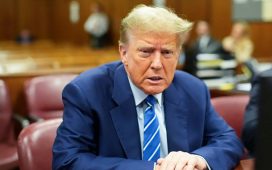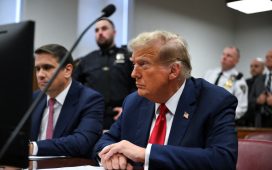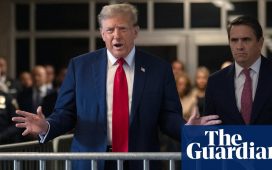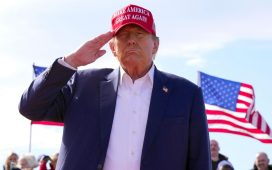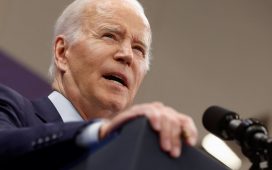WASHINGTON — Eager to repair their country’s fraught relationship with Washington, allies of President Volodymyr Zelensky of Ukraine have met with lobbyists with close ties to the Trump administration, hopeful of creating new channels of communication.
After more than two months of anxious waiting, Mr. Zelensky finally appears to have won support from the White House for a candidate to fill Ukraine’s vacant ambassadorship to the United States.
And Mr. Zelensky, still deeply dependent on American assistance, has been signaling, in hardly subtle fashion, that he and his officials will not assist in the impeachment process, keeping quiet in particular about the fact that his government knew weeks earlier than it has publicly acknowledged that Mr. Trump had frozen nearly $400 million in military aid to Ukraine.
Nearly every world leader has struggled to figure out how to deal with Mr. Trump. But few face greater pressure to find the answer — or more hurdles to doing so — than Mr. Zelensky.
Wiser now to the ways of Washington, he and his team are carefully trying to reestablish themselves in a variety of ways as an important ally with a substantive agenda deserving of Washington’s attention and support.
They have a long ways to go. Mr. Zelensky’s team has been discouraged by the absence of expected support from Mr. Trump for Ukraine’s peace talks with Russia, as well as the lack of follow-through from the White House on a promised Oval Office meeting with Mr. Zelensky that the administration had quietly signaled might happen in late January.
Mr. Zelensky’s allies were frustrated further by Mr. Trump’s meeting in the Oval Office on Tuesday with Sergey V. Lavrov, the Russian foreign minister. And when the president’s personal lawyer Rudolph W. Giuliani paid an unexpected visit to Kyiv last week in a continued effort to dig up dirt on Mr. Trump’s political opponents, no Ukrainian government officials met him.
Asked by an official at the German Marshall Fund on Friday what the Zelensky administration wants from Washington, Dmytro Kuleba, Ukraine’s deputy prime minister, who has been in Washington this week meeting with administration and congressional officials, said “all we are asking from our colleagues in the U.S. administration is fair treatment.”
He added, “We don’t want to be shamed and blamed.”
The continued push to try to overcome Mr. Trump’s grudge against Ukraine suggests Zelensky administration officials have concluded that impeachment will fail in the Senate and that they will almost certainly need to work with Mr. Trump for at least another year, and possibly another five years if Mr. Trump is re-elected.
“Our relations are not in good shape,” said Olena Zerkal, a former deputy foreign minister under Mr. Zelensky. “I don’t believe in any chemistry between our leaders.”
Mr. Zelensky’s willingness to accommodate the Trump administration has hardly gone unnoticed in Kyiv.
After the White House released a rough transcript of a July 25 call between the American and Ukrainian presidents, Mr. Zelensky was panned in Ukraine on social media for seeming too eager to please Mr. Trump. That included signaling a willingness to pursue the investigations sought by Mr. Trump into political targets like the family of former Vice President Joseph R. Biden Jr.
“Monica Zelensky,” the Ukrainian president was called on social media in Kyiv, in a reference to the intern whose sexual relations with Bill Clinton led to the last impeachment proceedings of an American president.
Even a White House visit, if it happens, risks being seen not so much as a triumph for Mr. Zelensky as more kowtowing to Mr. Trump, who could cite it as evidence he never linked such a visit, or American military assistance for Ukraine, to investigations that would benefit him politically.
“In Kyiv, we have to place bets on the current power in Washington,” said Nikolay Kapitonenko, professor at the Institute of International Relations. But outreach to the Republican administration is not risk free, he said, adding, “Zelensky understands that taking any side is dangerous.”
The importance of American support for Ukraine — and the desire for more of it from Mr. Trump — has been on display in recent days.
An American diplomat traveled to Kyiv to express support for the Ukrainians headed into Mr. Zelensky’s first face-to-face meeting with President Vladimir V. Putin of Russia on Monday in Paris.
But Trump administration officials privately told the Ukrainians that Mr. Trump himself would signal support, according to Americans and Ukrainians familiar with the matter, either via Twitter, as first reported by The Daily Beast, or possibly even an invitation for Mr. Zelensky to visit the White House next month. While Mr. Trump posted more than 100 tweets on Sunday, none expressed support for the Ukrainians headed into the peace talks.
The Trump administration had also resisted calls to levy sanctions against a Russian gas pipeline that would circumvent Ukraine. The White House reportedly worked to undermine congressional efforts to block the pipeline, though sanctions language was added to a $738 billion military policy bill that passed the House on Wednesday. And the military assistance that Democrats accuse Mr. Trump of using as leverage to force the investigations reportedly still has not fully reached Ukraine.
Those are among the issues that may help explain why the Ukrainians are considering stepping up their lobbying in Washington, despite potential political and financial costs.
During his campaign and early in his presidency, Mr. Zelensky proclaimed that he had no need to hire lobbyists like the government of his predecessor. “I never met a single lobbyist,” he said. “I don’t need this. I never paid a coin and I never will.”
Yet, in the weeks before Mr. Zelensky was elected in April, his advisers quietly worked with a Washington lobbying firm, Signal Group, to arrange meetings in Washington with Trump administration officials, as well as congressional offices and think tanks that focus on Ukraine-United States relations.
Mr. Zelensky distanced himself from the arrangement, even though Signal Group reported in a filing under the Foreign Agents Registration Act, or FARA, that it was paid nearly $70,000 by Mr. Zelensky’s party through a lawyer named Marcus Cohen. Mr. Cohen, on the other hand, claimed that the money came from his own pocket, not from Mr. Zelensky’s party.
The Justice Department’s National Security Division, which oversees FARA, sent a letter to Mr. Cohen requesting information about the arrangement, then urged him to register as a foreign agent, according to people with knowledge of the situation. One of the people said that the division also audited Signal Group’s filings, informing the firm in a letter in October that the inquiry was closed.
Signal defended its FARA filings as accurate, and referred questions about Mr. Cohen’s representations to him or Mr. Zelensky’s team. Neither responded to requests for comment.
Mr. Zelensky “may find that it is best to be his own spokesperson on this subject for a while to prevent others from interpreting his words for him,” at least until “trust can be rebuilt,” Heather A. Conley, who was a deputy assistant secretary of state in the bureau of European and Eurasian affairs from 2001 to 2005, said in an email.
Ms. Conley, who is director of the Europe program at the Center for Strategic and International Studies, was among the think tank officials who met with one Mr. Zelensky’s advisers in April in a meeting arranged by Signal and Mr. Cohen.
They discussed Mr. Zelensky’s anticorruption and economic overhaul plans, Ms. Conley said, adding, “Ukraine faces a fraught landscape in Washington — with or without a lobbyist.”
The discussions about hiring a lobbyist, which are described as preliminary, have divided Mr. Zelensky’s team.
Some are concerned that hiring a lobbying firm with ties to Mr. Trump could jeopardize Democratic support. And some are wary of becoming involved with K Street at all, because of the specter of Paul Manafort, Mr. Trump’s former campaign chairman, who was sentenced to seven and a half years in prison for crimes related to his lobbying for a deeply unpopular former Ukrainian government.
Yet two of the firms being discussed for possible lobbying engagement have links to Mr. Manafort, according to three people with knowledge of the discussions.
A representative of one of the firms, Mercury Public Affairs, which worked with Mr. Manafort on his Ukraine effort, met in Kyiv last month with a top aide to Mr. Zelensky. The lobbyist, Bryan Lanza, has ties to the Trump White House, and was in Ukraine on unrelated business according to people familiar with the meeting.
It was arranged by an American lawyer named Andrew Mac, who himself registered last month with the Justice Department as an unpaid lobbyist for Mr. Zelensky. Mr. Mac, who splits his time between Washington and Kyiv, was appointed by Mr. Zelensky last month as an adviser responsible for building support among the Ukrainian diaspora.
In a sign of the scrutiny in Kyiv on its new government’s tumultuous relationship with Mr. Trump, and efforts to calm it, secretly recorded video and photographs circulated of Mr. Lanza’s meeting with the Zelensky aide in a restaurant.
In an article featuring the photographs, a Ukrainian news outlet noted that Mr. Lanza helped lift sanctions against the corporate empire of the Russian oligarch Oleg Deripaska, a Kremlin ally. That arrangement was assailed by critics in Washington as a sweetheart deal that represented a capitulation to the Kremlin, while Mr. Lanza also lobbied to help remove potentially crippling sanctions on the Chinese telecom giant ZTE.
Mr. Mac said Mr. Lanza had been “very effective in working for his clients on difficult matters.”
Another firm that was discussed by Mr. Zelensky’s aides, Prime Policy Group, also has a Manafort link — albeit a more dated one. It was started by Charlie Black, a former business partner of Mr. Manafort’s in the 1980s and ’90s. Mr. Black’s firm has represented other clients in Ukraine, including Sergey Tigipko, a Ukrainian billionaire and former official in the government of Viktor F. Yanukovych.
Mr. Black said he had not had any conversations with Mr. Zelensky’s team about a possible contract, but would not be opposed to such an engagement.
Mr. Mac met this month in Washington to discuss Ukrainian energy issues with the former Representative Billy Tauzin, a Democrat turned Republican from Louisiana who is now a lobbyist. While someone with knowledge of the deliberations said Mr. Tauzin was not being considered as a potential lobbyist for Ukraine, he has connections that could be helpful. His congressional staff once included Dan Brouillette, who was confirmed this month as secretary of the Energy Department, upon which the Ukrainian government has relied for help with its power supply during brutally cold winters.
Ms. Conley suggested that Mr. Zelensky would be better served by an ambassador than a lobbyist, but the process of filling that vacancy has not been quick.
At least three names had been floated in recent months, and the Zelensky administration’s current preference for the position, Volodymyr Yelchenko, Ukraine’s ambassador to the United Nations, had been awaiting approval since late September or early October, according to people familiar with the process. They said that the State Department had signed off on Mr. Yelchenko weeks ago, but that the Ukrainians had grown anxious waiting for the White House to do so.
Officials in Kyiv were told that the approval would be formally communicated this week, they said. The White House and State Department did not respond to questions about the approval of Mr. Yelchenko.
Some attributed the delay to a quiet push by some Trump allies for a prospective ambassador who is closely aligned with Mr. Giuliani, Andrii Telizhenko, who had served as a low-ranking diplomat in the Ukrainian Embassy in Washington under the previous government.
He was embraced by Mr. Trump’s allies after claiming that the former American ambassador to Kyiv and other Ukrainian officials worked to undermine Mr. Trump’s 2016 campaign. In recent months, Mr. Telizhenko has worked closely with Mr. Giuliani to advance those claims. As part of the effort, the two men traveled together to Hungary and Ukraine last week to record interviews with former Ukrainian officials for a series of programs by a conservative cable channel seeking to undermine the impeachment proceedings.
It is unclear whether Mr. Zelensky’s team ever seriously considered Mr. Telizhenko as an ambassador candidate.
Kenneth P. Vogel reported from Washington, and Andrew E. Kramer from Kyiv.
